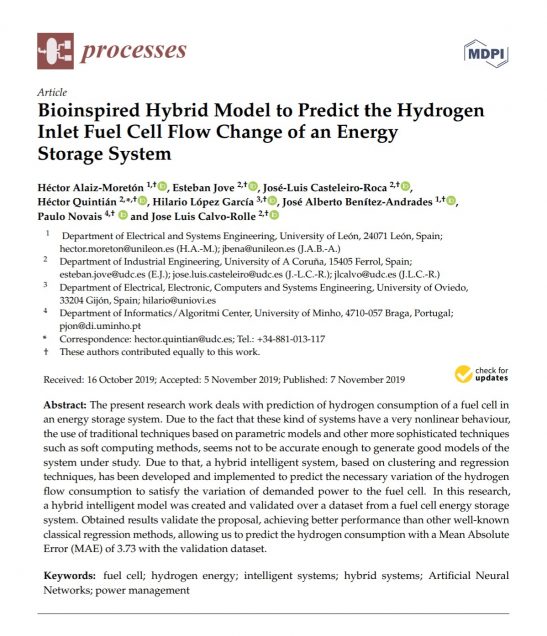Processes 2019, 7(11), 825; https://doi.org/10.3390/pr7110825
Article
Bioinspired Hybrid Model to Predict the Hydrogen Inlet Fuel Cell Flow Change of an Energy Storage System
1Department of Electrical and Systems Engineering, University of León, 24071 León, Spain
2Department of Industrial Engineering, University of A Coruña, 15405 Ferrol, Spain
3Department of Electrical, Electronic, Computers and Systems Engineering, University of Oviedo, 33204 Gijón, Spain
4Department of Informatics/Algoritmi Center, University of Minho, 4710-057 Braga, Portugal
*Correspondence: hector.quintian@udc.es; Tel.: +34-881-013-117
†These authors contributed equally to this work.
Received: 16 October 2019 / Accepted: 5 November 2019 / Published: 7 November 2019
Abstract:
The present research work deals with prediction of hydrogen consumption of a fuel cell in an energy storage system. Due to the fact that these kind of systems have a very nonlinear behaviour, the use of traditional techniques based on parametric models and other more sophisticated techniques such as soft computing methods, seems not to be accurate enough to generate good models of the system under study. Due to that, a hybrid intelligent system, based on clustering and regression techniques, has been developed and implemented to predict the necessary variation of the hydrogen flow consumption to satisfy the variation of demanded power to the fuel cell. In this research, a hybrid intelligent model was created and validated over a dataset from a fuel cell energy storage system. Obtained results validate the proposal, achieving better performance than other well-known classical regression methods, allowing us to predict the hydrogen consumption with a Mean Absolute Error (MAE) of 3.73 with the validation dataset.
Keywords: fuel cell; hydrogen energy; intelligent systems; hybrid systems; Artificial Neural Networks; power management

